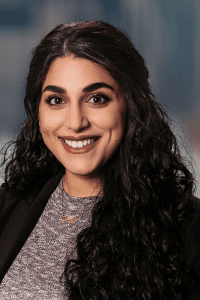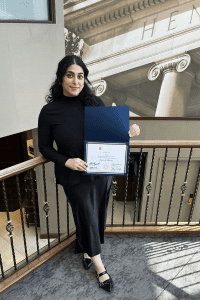 On the day of the Port of Beirut explosion in August 2020, Christy Khoury watched the devastation unfold on social media. Khoury, who was born in Lebanon but lived most of her life in Washington state, followed the updates closely as news spread that over 200 people had passed and more than 7,000 were injured.
On the day of the Port of Beirut explosion in August 2020, Christy Khoury watched the devastation unfold on social media. Khoury, who was born in Lebanon but lived most of her life in Washington state, followed the updates closely as news spread that over 200 people had passed and more than 7,000 were injured.
“I remember witnessing the amazing strength and mobilization of Lebanese on social media,” she said. “People were coordinating crisis response efforts in and outside of the country. Individuals on Instagram, Facebook, and Twitter were spreading awareness, raising funds, sending needed goods, and it was all being done on their screens.”
Khoury, a student at Syracuse University’s School of Information Studies, led a Seattle2Beirut response and helped collect goods for the Lebanese Red Cross.
“That entire experience motivated me to get a Ph.D. so I could learn more about crisis mobilization online,” she said. “Although my specific research interests have shifted since starting the program, I’m thankful that my research focuses on examining technologies used by an incredibly resilient community.”
Now a fourth-year Ph.D. candidate, Khoury plans to graduate next May with a Doctor of Philosophy in Information Science. Her dissertation is incredibly meaningful to her, she says, and focuses on the crisis informatics field, which uses an information science perspective to examine platforms, such as social media, used during times of crisis.
“Although I came into this program intending to research Twitter/X, I have actually shifted to examine TikTok as a crisis communication tool,” she said. “More specifically, my dissertation uses a mixed-methods approach to examine collective sensemaking and resiliency information behaviors exhibited on TikTok during the Port of Beirut explosion and the ongoing economic crisis in Lebanon.”
Since there isn’t a lot of crisis research on TikTok, her study aims to be a part of a larger and much-needed discussion that examines the platform’s unique communication style, especially during crisis response.
To conduct her research, Khoury has read hundreds of crisis communication and informatics work and says she has seen a need to re-think how ethical crisis research is conducted.
“Thinking about how to examine the technologies and information behaviors during a crisis, while also making sure we don’t forget to commemorate those who passed or were otherwise impacted is necessary,” she said. “That’s something that I’ve been also researching and hope to continue writing about.”
Khoury decided to do her research and study at the iSchool after contacting professors at several universities about their Ph.D. programs.
 “The professors at Syracuse were above and beyond in how kind they were,” she said. “I was able to book meetings during their busy schedules so I could talk about my research interests, learn about theirs, and overall just learn about what it means to complete a Ph.D. That kind of thoughtfulness and warm energy was unique to Syracuse. I was so intimidated by getting a Ph.D., so the thought of being able to come to a warmer community was really assuring.”
“The professors at Syracuse were above and beyond in how kind they were,” she said. “I was able to book meetings during their busy schedules so I could talk about my research interests, learn about theirs, and overall just learn about what it means to complete a Ph.D. That kind of thoughtfulness and warm energy was unique to Syracuse. I was so intimidated by getting a Ph.D., so the thought of being able to come to a warmer community was really assuring.”
Since coming to the iSchool, Khoury has been named a Research Excellence Fellow, which has allowed her to prioritize her dissertation this year. She was also able to teach undergraduate students IST 343 Data in Society and graduate students IST 719 Information Visualization. The school awarded her an Outstanding Teaching Assistant Award for her work.
“Those experiences affirmed how much I loved teaching,” she said. “I loved being able to develop those relationships with students and see them grasp the curriculum along the way. Although I intend to enter industry after my Ph.D., I would like to find an adjunct position in the future so I can keep engaging with students and their education.”
Khoury has been documenting her Ph.D. journey on Instagram, @my_phd_chronicles, and says her career goals are similar to most people’s. She simply wants to do meaningful work that positively impacts people’s lives.
“Although I came into this program intending to pursue academia and professorship afterwards, my goals now have shifted to now intending to re-enter industry,” she said. “I’m interested in User Research now as I think that blends my pre-Ph.D. and Ph.D. skill sets well. I’d love to work for a company whose product or service I actually use and want to improve for other users.”
